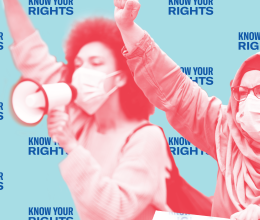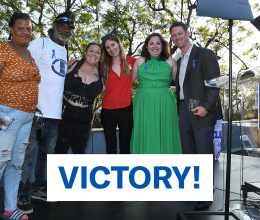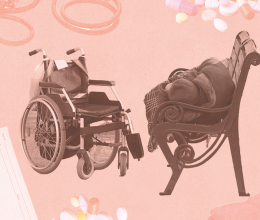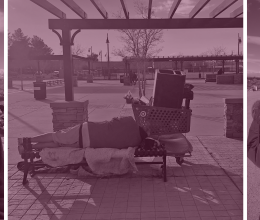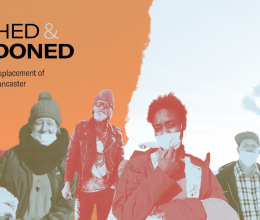
Report, Two Years in the Making, Spotlights Banishment of Unhoused People to the Desert
LANCASTER — Centuries ago, people were banished to the desert by oppressive rulers. Tragically, the City of Lancaster, in north Los Angeles County, has brought this practice back — it’s just one of the brutal, unlawful ways it treats people who are homeless.
Today, the American Civil Liberties Union Foundation of Southern California releases a comprehensive report — “Banished and Abandoned: Criminalization and Displacement of Unhoused People in Lancaster” — that details the relentless persecution of unhoused people in that city by Lancaster officials and the Los Angeles Sheriff’s Department (LASD).
This thinly veiled war on people who are homeless has pushed many of them out of the city to harsh, isolated and life-threatening conditions in the Mojave Desert.
“Responding to homelessness by criminalizing, banishing and disenfranchising our unhoused neighbors is unlawful and potentially deadly,” said Eve Garrow, homelessness policy analyst and advocate at the ACLU SoCal. “It must stop now.”
In Lancaster, people who are unhoused are subject to harassment and exorbitant fines for as little as sitting in a public park for a few minutes or sleeping outdoors — an unavoidable practice for people who have no access to housing or shelters.
People experiencing homelessness make up only 1.3 percent of Lancaster’s population, according to a U.S. census report, but they are the target of more than 25 percent of LASD contacts in that city that result in municipal citations with fines usually far beyond a person’s means to pay.
The ACLU report details violations of the U.S. and California Constitutions in the treatment of unhoused people in Lancaster, including restriction of movement, denial of due process, and the infliction of cruel and unusual punishment for human conduct as basic as seeking refuge in the shade.
Whatever critical possessions unhoused people pull together can be targeted by law enforcement officers who “red-tag” tents and other dwellings as illegal. Among numerous personal stories in the report is one by a man who had his tent thrown out, along with his state identification, Social Security and MediCal cards — the very lifelines needed to survive.
More than 50 people who are homeless in the city and its surrounding area in the Mojave Desert — whether living in tents, cars, or sleeping on the ground — were interviewed over a nearly two-year period for this report, as well as an extensive analysis of public records.
Nearly all those interviewed outside city limits said law enforcement officers had given them a direct order or firm “suggestion” to relocate, though some chose to do so in attempts to escape on-stop police harassment. (Because sheriff deputies also patrol unincorporated areas outside Lancaster, the criminalization and harassment often continue).
Desert temperatures are extreme, putting life in peril. And the banishment can mean being left far from hospitals and critical social services. Even grocery stores can be at a crippling distance.
A woman known as “J” in the report was pushed further and further into desert areas by police “red tagging” her tent as an illegal dwelling. She described, in her interview, walking from her isolated desert outpost to the nearest grocery source — a gas station convenience store — during the day because there were no outdoor lights. “I had to haul water in a stroller in 5-gallon jugs,” she said. “I got heat stroke because I was trying to walk to the store in the heat.”
Finally making it back to her tent, she lay there for three days. “My phone died and I couldn’t get help. Nobody was around. I was rationing my water, and it was over 100 degrees. I was waiting to die.” Luckily, a relative who could not reach her by phone found her and nursed her back to health.
Being pushed out of the city not only marginalizes and isolates people, it also often means losing the opportunity to vote in municipal elections, denying them even that say in policies and the election of officials. Melissa Ivory, who was banished to the high desert by city workers and the LASD, said the city “left us with no vote and no voice. We are like a piece of wind that carries a voice, but it is not heard at all.”
The report lists key recommendations, including decriminalizing homelessness by removing laws that make criminals of unhoused people simply for sleeping outside or engaging in survival strategies to stay alive. Others: stop forcibly moving and banishing people who are unhoused; stop seizing and destroying personal property; and invest in affordable and permanent supportive housing.
The full report is at: https://www.aclusocal.org/en/publications/banished-and-abandoned
